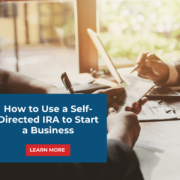Self-Directed IRA Compliance: A Guide to Avoiding Prohibited Transactions
Imagine you’re investing in a Self-Directed IRA. All is going smoothly. Your assets are situated neatly in your retirement account, you’re enjoying outstanding returns, and eyeing an early retirement. Then, one day, you find out that the IRS regards some of your retirement investments not as retirement investments at all—but as regular personal investments. You have to withdraw them from the account, facing stiff penalties and fines. Not ideal. That’s why good Self-Directed IRA compliance won’t only help you keep your account in order, but will give you peace of mind knowing that this will never happen to you. And it all boils down to one concept: avoiding prohibited transactions. Here’s what you’ll need to know.
Understanding Prohibited Transactions
First things first: let’s clarify what a prohibited transaction is. Think of prohibited transactions as any improper use of your Self-Directed IRA assets, particularly transactions that benefit you or certain family members personally. It’s a set of rules designed to keep your retirement account safe from conflicts of interest and to ensure that it serves its intended purpose: to provide for your retirement. A prohibited transaction prevents you from interacting your IRA with a “disqualified person.”
Who counts as a “disqualified person”? This category includes yourself, meaning you can’t use your Self-Directed IRA funds for personal gain. It also includes close family members, such as your spouse, children, grandchildren, parents, and even your in-laws. Essentially, anyone with whom you have a close relationship can pose a potential conflict of interest. Business entities in which you have a significant ownership interest, for example, are also considered disqualified persons. Engaging in a transaction with any of these individuals or entities could lead to a prohibited transaction, which puts your entire retirement account at risk.
Common Prohibited Transactions to Avoid
Now that you know who disqualified persons are, let’s dive into some common prohibited transactions.
One clear example is direct personal use. If you invest in real estate through your Self-Directed IRA, you can’t live in it, rent it out to a family member, or use it for yourself. Another common pitfall is selling property to your IRA. You can’t transfer personal property to your IRA, as this transaction is considered a prohibited transfer.
Providing services through your IRA also poses a risk. If you run a business, you can’t use your Self-Directed IRA to pay yourself for services rendered, including for repairs or improvements on property owned by your IRA. Finally, engaging in excessive transactions or making frequent changes to your investment strategy can trigger scrutiny from the IRS. If it appears as though you’re running a business rather than managing a retirement account, you risk falling into prohibited transaction territory.
How to Maintain Compliance in a Self-Directed IRA
Staying compliant with IRS regulations isn’t just about knowing the rules; it’s about implementing practices that help you avoid pitfalls. Educating yourself on IRS guidelines for Self-Directed IRAs is a great start. You might also consider consulting professionals, such as custodians who specialize in Self-Directed IRAs, to help you weave your way through complex transactions.
Interested in learning more about Self-Directed IRAs? Contact American IRA, LLC at 866-7500-IRA (472) for a free consultation. Download our free guides or visit us online at www.AmericanIRA.com.








